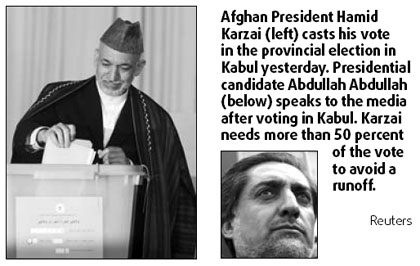|
|

2009 Afghan Presidential Election > Top News
|
Voter turnout low amid Taliban threatsBy AP in Kabul and Zhang Xin in Beijing (China Daily)
Updated: 2009-08-21 07:54
Taliban threats kept voter turnout low in the capital and the militant south yesterday, as Afghans chose the next president for their deeply troubled country. Government officials expected to announce election results as soon as Saturday. Afghanistan's top security officials said 26 civilians and security forces had died in election-day militant attacks. Security officials said eight Afghan soldiers, nine police and nine civilians died. The top UN official in the country, Kai Eide, said there were scattered attacks but added that the election "seems to be working well". A UN spokesman said there were no early reports of widespread irregularities. Afghanistan's ambassador to China, Sultan A. Baheen, expressed confidence in Beijing yesterday that his countrymen would feel secure enough to vote. "I think it surprised everybody how determined the Afghan people are after all the problems and difficulties to elect their leader for the next five years," he told China Daily. "But for sure, the security challenge is a concern. "You know, Afghanistan is in the process of state-building. This is a long process," he said.
Low turnout in the south was expected to harm President Hamid Karzai's re-election chances and boost the standing of his top challenger, former Foreign Minister Abdullah Abdullah. Turnout in the north appeared to be high, a good sign for Abdullah. Another factor in the election is that some Afghans feel indifferent about the election, not caring who will win. International officials have predicted an imperfect election - Afghanistan's second-ever direct presidential vote - but expressed hope that Afghans would accept it as legitimate, a key component of US President Barack Obama's war strategy. Taliban militants, though, had threatened voters and pledged to disrupt the election. Baheen said: "Afghans still see the international forces and the Americans as liberation forces. "Probably, as a freedom-loving people, if you were to ask Afghans, 'Do you want the international forces, foreign forces in Afghanistan?' maybe the majority would say 'No'. But if you say, 'Do you want the American and other forces to leave the country now?' the majority would say 'no'; we remember the tyranny of the Taliban."
"The main security policies that will be implemented by the new Afghan government will not change much because the government's policy is largely under NATO influence," said Wang Yizhou, an expert on International Politics with the Chinese Academy of Social Sciences (CASS). "The US has shifted to a dual-track policy toward Afghan security - to use military power as well as peace talks, which are practiced by Karzai." Ethnic divisions An Associated Press reporter who visited six polling centers in Kabul said he saw no lines, and a voting official in Kandahar, the south's largest city and the Taliban's spiritual birthplace, said voting appeared to be 40 percent lower than during the country's 2004 presidential election. About 17 million Afghans are eligible to vote. There are nearly 7,000 voting centers and about 29,000 polling booths in the country, but some were closed due to security reasons. Eight of Afghanistan's 364 districts are under Taliban control and will not be able to hold elections, according to the Interior Ministry. "The election in Afghanistan is a race between different ethnic groups," said Wang Shida, a researcher in Afghan studies at China Institute of Contemporary International Relations in Beijing. "In the southern part of Afghanistan, particularly around Kandahar, where Taliban threats have been the worst, voters are under great pressure to cast their ballots. Most of them are Pashtuns, of Karzai's ethnic group, making up 40 percent to 50 percent of the Afghan people." Low turnout will cost Karzai votes there. But, he said, "in the northern part of Afghanistan, where a better turnout (is expected) due to fewer Taliban attacks, Abdullah would benefit." But Karzai most likely will be the winner, said CASS analyst Wang. "He realizes he must root out the Taliban in a more effective manner by combating drug-trafficking and turning over the Taliban's financial centers, recruitment centers, etc. "Nevertheless, he also has to focus on economic growth to improve the livelihood of the country," said Wang.
 Baheen agreed, noting that China's $4 billion commitment to a copper mine south of Kabul was the biggest foreign investment in Afghanistan's history. "And China built a new hospital in Kabul that opened last week. "But as an Afghan, I expect more," he said. "I'm not satisfied, to be honest." He said China invests more in Brazil and in Africa, which are "a long way from Afghanistan." Sporadic violence Scattered reports of violence trickled in from around the country yesterday, including a rocket in Helmand and an explosion in Kabul. In northern Baghlan province, insurgent attacks closed 14 polling sites, said Abdul Malik, the provincial election director. More than 20 rockets landed in the capital of Lashkar Gah, including one near a line of voters that killed a child. The Foreign Ministry asked news organizations to avoid "broadcasting any incidence of violence" during voting hours "to ensure the wide participation of the Afghan people." Because of that order, Afghan officials were reluctant to confirm reports of violence. Karzai, dressed in his traditional striped robe, voted at 7 am at a Kabul high school. He dipped his index finger in indelible ink - a fraud prevention measure - and held it up for the cameras. Karzai, who has held power since the Taliban was ousted in late 2001, is favored to finish first among 36 official candidates, although a late surge by Abdullah could force a runoff. Meanwhile, presidential candidate Ramazan Bashardost, who had 10 percent support in pre-election polls, said he washed off the supposedly indelible ink and called on authorities to "immediately stop this election." "This is not an election, this is a comedy," Bashardost said. Xinhua contributed to the story (China Daily 08/21/2009 page1) |